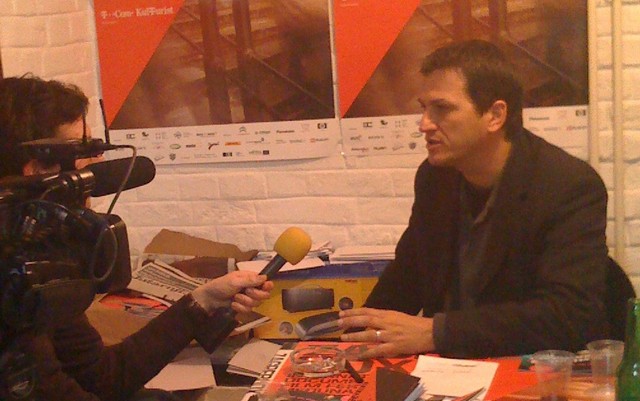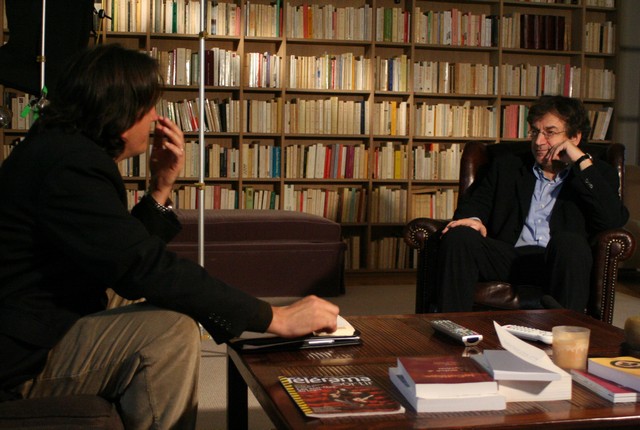Brian Gallagher interviewed Croatian American filmmaker Jack Baric
http://www.croatia.org/crown/articles/9753/1/Brian-Gallagher-interviewed-Croatian-American-filmmaker-Jack-Baric.html
By Brian Gallagher
Published on 03/21/2009



 | Exclusive interview with American Croatian filmmaker Jack Baric, the director of the new film, 'Searching for a Storm', published by Croatian Herald (Australia) 13 March 2009. New documentary about 'Operation Storm' which liberated the occupied parts of Croatia in 1995, and saved the city of Bihać in BiH from tragedy. Interviewer: Brian Gallagher, London; Jack Baric on the photo. |
Documentary about 'Operation Storm' which liberated Croatia in 1995 and saved Bihac in BiH

Jack Barić in Zagreb in February 2009.
| Croatian Herald (Australia) 13 March 2009 Exclusive interview with American Croatian filmmaker Jack Baric, the director of then new film, 'Searching for a Storm' New Documentary about 'Operation Storm' Interviewer: Brian Gallagher An important new English language documentary film about the case of Croatian General Gotovina just premiered in Zagreb. It has aroused much press interest in Croatia, so what better way to find out more than by asking the director some questions... Q: Can you tell us something about your background and how the film came about? My parents are Croatian immigrants to Los Angeles and so when the war started in 1991 I was among those young Croatian-Americans that got involved in trying to show the U.S. government and media that Milosevic was the aggressor in this war and that the Croatian and later Bosnian people deserved their support. Gotovina's case stirred up all those feelings of frustration we felt when international diplomats described this as a civil war and not a war of Serbian aggression. I felt that the UN was manipulating their court at the ICTY to create a narrative that justified their policies during the war and it angered me - so I made the film. Q: What point of view is 'Searching for a Storm' putting forward? The point of view of the film is probably best described as capturing the frustration of the Croatian (and Bosnian) people on the ground who suffered during the war and were outraged by the international community's ignorance and unwillingness to do the right thing, which would have been to either stop Milosevic or allow the Croatian people to defend themselves without being equated with the force that was occupying their country. And this, of course, carries forward with the Gotovina case. Q: Were you able to talk to General Gotovina about the documentary? I was not. ICTY rules prohibit him being interviewed and I didn't want them to manipulate any conversation I may have had with him into something that caused trouble for either of us. Q: How has the ICTY reacted to the film? You'll have to ask them, but I doubt they're happy. Q: From the trailer and website, there seems to be a number of international commentators, including Robin Harris and Carole Hodge from the UK, Sonja Biserko from Serbia, Alain Finkielkraut from France. Was this intentional i.e. trying to show concerns over what is happening is not restricted to Croatia? If we had just gone out and interviewed Croatians for the film I would have been rightly accused of making a propaganda film. You didn't mention it in the question, but I also interviewed Anton Nikiforov, who was at the time the spokesperson for the ICTY prosecution, and Dejan Anastasijevic, a reporter for Vreme in Belgrade. Neither of these men share my opinions about the war or Gotovina, but allowing their opinions to be heard in the film has given it much more credibility and will allow honest people who see the film to make their own determinations about the war and the case. Q: Is the issue of the Serb leadership ordering its own population out of Croatia covered? Robin Harris talks about the fact that the entire case rests on the premise that the Croatians conspired to expel the Serbs and the Serbs weren't there because the Serb leadership had already ordered them to evacuate. Luka Misetic adds that in the Milosevic case the ICTY said he evacuated the Serbs to Bosnia and Kosovo so that they could solidify their war gains in those places and that they flipped in the Gotovina case to say that it was he who cleansed the Serbs. You'll have to see the film to hear Nikiforov's lame response. Q: Although doubts about the Gotovina case have previously been raised, it seem to be a taboo subject - along with any criticism of the ICTY - amongst most human rights activists. What do you attribute that to? Honestly, among human rights activists I think one of the reasons it has been a taboo subject is because it might not seem sensitive to the victims of the crimes that were committed in the aftermath of Storm. That's a major issue here that everyone will have to grapple with, which is that crimes were committed and the feeling in some quarters is that someone has to pay and (no pun intended) it is Gotovina who is paying. It takes a certain courage to acknowledge that wrongs have been done, but the guy in the jail cell might be a scapegoat for an entirely different set of political goals - and this is a courage that I find lacking in most places. Q: Are you expecting the film to raise awareness of the concerns over the case against General Gotovina outside of Croatia? What interest outside of Croatia have you had? When you make an independent film, as I have, you must fight every day to create interest in the subject that you are covering because many other better financed projects are ahead of you in line and so it is my hope that ordinary Croatians take it upon themselves to give me a hand in bringing attention to the film and the subject it covers, which is so important to us. I really won't be able to do this alone. Q: Do you think General Gotovina will receive justice from the ICTY? I'm cautiously optimistic. Although they would never admit to tracking media coverage, I do believe it is important for the judges to know that there are a variety of opinions on this matter and not just the usual dribble that portrays anyone who defends Gotovina as some ueber nationalist. Q: The film has premiered at the prestigious Zagreb Dox festival; will it be appearing at other film festivals? The current plan is to get it out to as many places as quickly as possible and so I'm bypassing the festivals and going straight to the people. We will be distributing in Croatia, North America, Australia, and maybe Germany. The DVD should also be available on our website, www.searchingforastorm.com in May. Q: A lot of people reading this will be keen to seen this documentary, how can they do so? The best way of keeping in the loop for the project will be to yisit www.searchingforastorm.com for screening and DVD updates. |

Jack Barić interviewing Alain Finkelkraut in Paris for his documentary about Operation Storm in Croatia.

Brian Gallagher, London: www.croatiafocus.com
Formated for CROWN by prof.dr. Darko Žubrinić
Distributed by www.Croatia.org . This message is intended for Croatian Associations/Institutions and their Friends in Croatia and in the World. The opinions/articles expressed on this list do not reflect personal opinions of the moderator. If the reader of this message is not the intended recipient, please delete or destroy all copies of this communication and please, let us know!